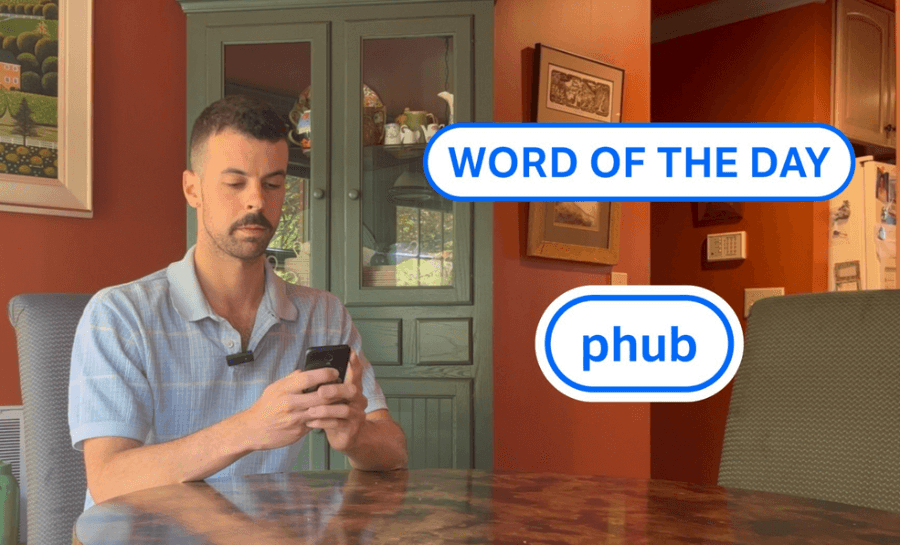📑Table of Contents:
Phub, also called Phubbing, a term that combines “phone” and “snubbing,” has become a modern epidemic. It refers to the act of ignoring someone in favor of your smartphone. Picture this: you’re at dinner with a friend, and they constantly check their phone, barely engaging in the conversation. This behavior, known as phubbing, affects relationships, productivity, and mental health. Yet, many of us do it without realizing the harm it causes. Let’s explore how this habit impacts our lives and why it’s time to stop.

The Rise of Phub: How Did We Get Here?
Phub began as smartphones became a central part of our daily lives. We use our phones for communication, entertainment, information, and work. The constant notifications, social media updates, and messages create a need to check our phones frequently. It’s almost reflexive; we reach for our phones without thinking.
However, this behavior comes at a cost. Phubbing disrupts face-to-face interactions. It sends a message that the person in front of you is less important than whatever is happening on your screen. Over time, this habit can strain relationships, reduce productivity, and affect emotional well-being.
Why Do People Phub?
Several factors contribute to phubbing. Firstly, the design of smartphones and apps encourages constant engagement. Notifications trigger a dopamine release, giving us pleasure and satisfaction. This creates a loop where we repeatedly check our phones to experience that rush.
Secondly, social media platforms thrive on engagement. They use algorithms to show content that keeps users scrolling. As a result, people spend more time on their devices, often at the expense of real-life interactions.
Lastly, fear of missing out (FOMO) drives many to stay glued to their screens. They worry about missing important news, updates, or social events. This anxiety makes it hard to put down the phone, even during social gatherings or important conversations.
The Impact of Phubbing on Relationships
Phubbing damages relationships in subtle yet profound ways. When you choose your phone over a person, you communicate that they are not a priority. This behavior can lead to feelings of rejection, frustration, and loneliness. Over time, these feelings erode trust and connection.
Phubbing in Romantic Relationships
Phubbing can be particularly harmful in romantic relationships. Partners who feel ignored often express dissatisfaction. They may feel less valued or appreciated. Studies show that couples who experience frequent phubbing report lower relationship satisfaction. They argue more and feel less connected.
When one partner constantly checks their phone, it interrupts meaningful conversations. It prevents couples from fully engaging with each other. Over time, this can create emotional distance, reducing intimacy and understanding.
Phubbing Among Friends and Family
Phubbing also affects friendships and family bonds. Imagine sitting with friends, trying to share a story, and everyone is on their phones. You feel ignored and unimportant. Over time, this creates a sense of isolation.
With family, phubbing can weaken connections. Parents who phub their children may miss important moments. Children, in turn, may feel neglected. This behavior sets a poor example, teaching kids that it’s okay to prioritize screens over people.
The Psychological Effects of Phubbing

Phubbing doesn’t just affect relationships; it also impacts mental health. When people feel ignored or undervalued, they experience negative emotions like anxiety and depression. Research shows that phubbed people often feel less satisfied in their social lives.
The Cycle of Loneliness and Phubbing
Phubbing creates a cycle of loneliness. When people feel ignored, they may turn to their phones for comfort. They browse social media, looking for validation or connection. However, this only deepens the problem, leading to more screen time and less face-to-face interaction. This cycle can increase feelings of isolation and anxiety, worsening mental health.
Phubbing also affects self-esteem. People who are often phubbed may question their worth or importance. They may feel insecure in their relationships, wondering if they matter less than the content on a phone screen. These doubts can erode confidence and contribute to mental health issues.
Breaking the Habit: How to Stop Phubbing!
Stopping phubbing requires conscious effort and mindfulness. Here are some strategies to help:
Set Boundaries with Technology
Set specific times to check your phone, like during breaks or after work. Create phone-free zones, such as the dining table or the bedroom. By setting these boundaries, you can reduce the urge to check your phone constantly.
Practice Mindful Communication
When engaging in conversations, practice mindful communication. Put your phone away, make eye contact, and listen actively. Show that you value the person in front of you. This small act of respect can strengthen relationships and reduce phubbing.
Use Digital Well-being Tools
Many smartphones offer digital well-being tools to monitor screen time. Use these tools to set limits on app usage. Track your phone habits and make adjustments to reduce unnecessary screen time. This awareness helps you break the habit of constantly reaching for your phone.
Encourage Real-Life Interactions
Make time for real-life interactions. Plan activities that encourage connection, like walks, dinners, or games. By prioritizing face-to-face time, you reduce the opportunity for phubbing.
The Benefits of Reducing Phubbing
Reducing phubbing has numerous benefits. First, it strengthens relationships. When you give someone your full attention, they feel valued and appreciated, which fosters trust and deepens connections.
Secondly, reducing phone usage can improve mental health. Less screen time means less exposure to negative content and less social comparison. It allows more time for activities that boost mood, like exercise, hobbies, or socializing.
Finally, reducing phubbing can increase productivity. When you focus on tasks without constant phone interruptions, you accomplish more. This focus leads to better work quality and greater satisfaction.

Wrap-up!
Phubbing may seem like a harmless habit, but its effects run deep. It hurts relationships, damages mental health, and creates a cycle of disconnection. Yet, the solution is simple: awareness and intention.
We can combat phubbing by being mindful of phone use, setting boundaries, and prioritizing real-life connections. It’s time to put down our phones and reconnect with the people around us.





